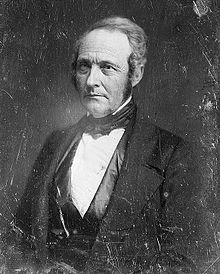
Back چاكوب كولامير ARZ جیکوب کولمار AZB Jacob Collamer German جیکوب کولمار Persian ג'ייקוב קולמר HE Jacob Collamer Hungarian Jacob Collamer Italian ジェイコブ・コラマー Japanese Jacob Collamer Swedish
Jacob Collamer | |
|---|---|
 | |
| United States Senator from Vermont | |
| In office March 4, 1855 – November 9, 1865 | |
| Preceded by | Lawrence Brainerd |
| Succeeded by | Luke P. Poland |
| Judge of the Vermont Circuit Court | |
| In office 1850–1854 | |
| Preceded by | Seat established |
| Succeeded by | Abel Underwood |
| 13th United States Postmaster General | |
| In office March 8, 1849 – July 22, 1850 | |
| President | Zachary Taylor Millard Fillmore |
| Preceded by | Cave Johnson |
| Succeeded by | Nathan K. Hall |
| Member of the U.S. House of Representatives from Vermont's 2nd district | |
| In office March 4, 1843 – March 3, 1849 | |
| Preceded by | William Slade |
| Succeeded by | William Hebard |
| Associate Justice of the Vermont Supreme Court | |
| In office 1833–1842 | |
| Preceded by | Nicholas Baylies |
| Succeeded by | William Hebard |
| State's Attorney of Windsor County | |
| In office 1820–1824 | |
| Preceded by | Asa Aikens |
| Succeeded by | Isaac Cushman |
| Personal details | |
| Born | January 8, 1791 Troy, New York, U.S. |
| Died | November 9, 1865 (aged 74) Woodstock, Vermont, U.S. |
| Political party | Whig (Before 1854) Republican (1854–1865) |
| Spouse | Mary Stone |
| Children | 7 |
| Education | University of Vermont (AM) |
| Military service | |
| Allegiance | United States |
| Branch/service | Vermont Militia |
| Years of service | 1812–1815 |
| Rank | First Lieutenant |
| Unit | 4th Regiment, Vermont Detached Militia Brigade 2nd Brigade, 4th Division |
| Battles/wars | War of 1812 |
Jacob Collamer (January 8, 1791 – November 9, 1865) was an American politician from Vermont. He served in the U.S. House of Representatives, as Postmaster General in the cabinet of President Zachary Taylor, and as a U.S. Senator.
Born in Troy, New York, and raised in Burlington, Vermont, Collamer graduated from the University of Vermont, studied law, and was admitted to the bar in 1813. After service in the militia during the War of 1812, he became active as an attorney, first in Royalton, and then in Woodstock. Highly regarded in the legal profession, he became a respected prosecutor, legislator, and judge.
Elected to the House of Representatives in 1842, Collamer became a prominent Whig leader and advocate of the anti-slavery cause. President Taylor selected Collamer to serve as Postmaster General following the 1848 presidential election. Collamer served until shortly after Taylor's death when he resigned to allow Taylor's successor, Millard Fillmore, to name his own appointee.
Collamer was elected to the Senate as a Republican in 1855, shortly after the formation of the new party. He became a respected voice against slavery and a prominent supporter of the Lincoln administration during the American Civil War. An advocate of more stringent postwar Reconstruction measures than those that were favored by Lincoln and his successor, Andrew Johnson, Collamer advocated congressional control of the Reconstruction process. He died in Woodstock and was buried at River Street Cemetery in Woodstock.